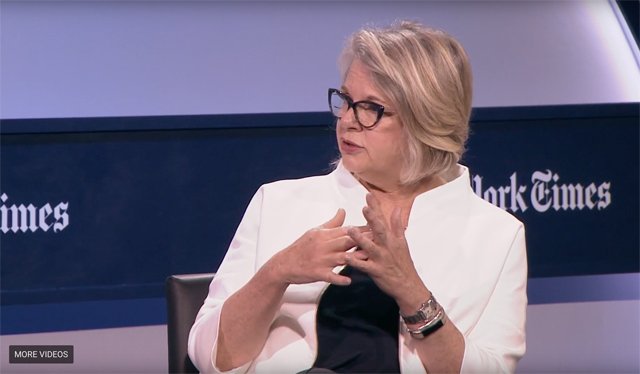 NEW YORK (May 31, 2018) – Policymakers and college leaders from the across the country took the stage last week at The New York Times’ Higher Education Leaders Forum.
NEW YORK (May 31, 2018) – Policymakers and college leaders from the across the country took the stage last week at The New York Times’ Higher Education Leaders Forum.
UNC System President Margaret Spellings helped set the agenda during a morning panel about declining public trust in colleges and universities. She called for stronger accountability measures and better data to help colleges demonstrate their value.
“The people really punching above their weight are community colleges, comprehensive universities, and HBCUs,” she said, referring to regional universities and historically black colleges that have been shown to dramatically improve upward mobility. “But we can’t tell our story because we don’t have the fact base.”
Having better measurements of value would help persuade skeptical lawmakers to support strong universities, Spellings argued.
“We’re underinvesting in our seed corn,” she said, referring to a nationwide trend of lower state investment in higher education.
She noted that for the first time, state universities across the nation received more revenue from tuition than from state appropriations last year. But North Carolina is not part of that trend, she said, and remains “the envy of the nation” in its level of state funding.
Spellings also pointed to neglect and lack of funding for K-12 teacher preparation and training. The better K-12 schools are, the better universities are, she said.
U.S. Sen. Lamar Alexander, R-Tenn., Chairman of the Senate Health, Education, Labor and Pensions Committee, pointed to controversies over free speech and ideological diversity as a key reason for eroding trust in colleges, especially among conservatives.
“I think this is the single biggest threat to support for higher education today,” he said, arguing that conservative students feel ostracized on many campuses. “Give students the privilege of being exposed to different points of view.”
Alexander also spoke up for the core value of liberal arts education, noting that a college degree is meant to be more than just a collection of skills.
“The point of college is not to get a job,” he said. “Broad education is more important than ever.”
Students have to be prepared for a lifetime of change, he said, citing President Trump’s daily tweets as an example of the unpredictable challenges with which lawmakers must cope.
Alexander’s call for more conservative voices echoed sentiments from David Axelrod, former advisor to President Barack Obama and now Director of the University of Chicago Institute of Politics.
Axelrod described the many controversial speakers he’s hosted at Chicago and the productive conversations they’ve sparked among students.
“This is the most public-spirited group of students I’ve seen since the ‘60s,” he said. “They are skeptical, but not cynical. And they are looking for a way forward.”
Author and advocate Wes Moore and Eloy Ortiz Oakley, Chancellor of California’s Community College System, both called for much greater flexibility to help working adults earn degrees, and for closer partnerships with employers to help students cope with a fast-changing economy.
Innovative programs and accountability through data will both get a boost from Michael Bloomberg’s charitable foundation. The former New York mayor and billionaire philanthropist was on hand to announce a $350 million investment to improve schools and colleges across the country.
“Focus on what works based on what the data says,” Bloomberg said.
“The spoils will go to the better-educated.”

Leave a Reply